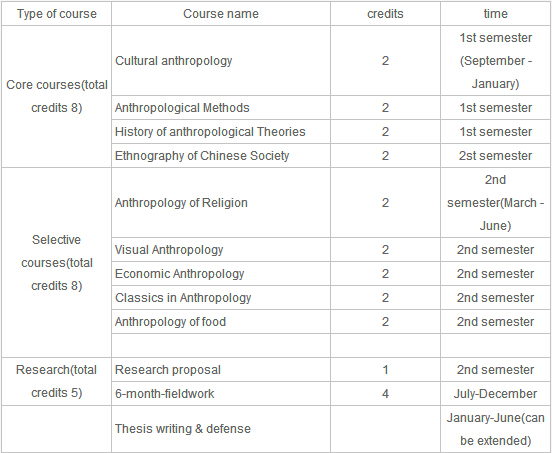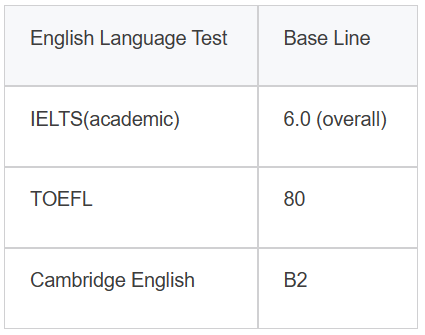| Degree: | Master |
 Starting Date: Starting Date:
Please be subject to the starting date on admission letter you got, since the starting date may change.
|
Sep 5 , 2024 |
| Duration: | 3 Years |
| Teaching Language: | English |
| Tuition Fees: | RMB 35,000 per Year |
 Application Deadline: Application Deadline:
The deadline means the date of Beijing time. You are suggested to submit your application 3 or 5 days before the actual deadline so that you can have time for necessary changes on documents.
|
Jun 15 , 2024 |
 Application Fee: Application Fee:
The application fee charged by the university, CUCAS only collect on their behalf.
|
USD 164 (Check Policy) |
 Service Fee: Service Fee:
For the service CUCAS provide to you. If you get a scholarship while applying as a self-financed applicant, you need to pay another scholarship service fee of 200 USD.
|
USD 54 (Check Policy) |
Overview
The Research Institute of Anthropology in the School of Social Development, East China Normal University, was established in the autumn of 2011, and has now completed three highly successful years of its existence.
Our broad areas of research are Socio-Cultural Anthropology, and Applied Anthropology. Specific sub-disciplines of Anthropology represented in the Institute include Visual Anthropology, the Anthropology of Food (Ecological Anthropology), Ethnicity (in China), and now Economic Anthropology. Individual research within the Institute currently concentrates on new understandings of the urban/rural interface, the links between locality and globalization and transnational influence, changing notions of the body, governmentality, histories of the self and individuality in China, diverse forms of spirituality in the modern world, cultural difference and identity, global business, and environmental constraints on cultural behaviours. The programme also contributes to urban studies by allowing in-depth intensive small-scale studies of local communities within urban settings focusing on the relations between transnational influences and urbanisation, and the links between urbanisation, modernity and development.Specific research topics (in which graduate researchers can become involved) cover topics such as migration, ethnicity, development, religion, education, business, and environmental and gender issues.
Specific aims and targets over the next 5 years include the preparation of a textbook and reader of anthropological research suitable for the Chinese context, an edited collection by members of the Institute, the organization of a national conference on the ethnography of Southwest China, the organization of an international conference on issues in the anthropology of China, the establishment of an externally funded visitors’ and fieldwork programme, and ultimately a fully-fledged undergraduate programme in the subject.
Broader and more fundamental aims are to 1) train and educate a new cohort of socially and culturally aware social scientists familiar with anthropological readings, anthropological techniques and theories and their practical applications in a wide range of fields including visual, ecological, and developmental anthropology; 2) to support the intensive and long-term fieldwork of graduate researchers in a variety of social settings in China; 3) to forge international linkages and specific local networks of benefit to our research students; 4) to locate and find work opportunities in China’s job market for our graduates; 5) to match their skills with work opportunities in China; and 6) to produce a range of academic theses and publications including an in-house Journal dedicated to the field of socio-cultural anthropology and its practical applications in China. Fieldwork is the basis of our discipline and it is a priority to encourage long-term and intensive fieldwork-based research on issues of topical concern and interest at all levels. We will develop specific research clusters on gender and processes of social exclusion and marginalization, migration processes and their importance in changing local landscapes, and the changing roles of ecology and food. We hope to hire a full-time Research Assistant to assist in the management of the visual anthropology laboratory and other matters within the coming year.
The graduate programme in Social and Cultural Anthropology in the Research Institute of Anthropology at East China Normal University offers a 3-year MA programme which may lead to the PhD, or can be undertaken on its own. Our fields cover general socio-cultural anthropology and applied anthropology, with particular specialities and courses in the anthropology of food, visual anthropology, the anthropology of development, the anthropology of religion, ethnicity and minorities in China.
The MA programme is centred on the core courses of Cultural Anthropology, Anthropological Theory, and Anthropological Methods. Major elective courses include Issues of Power and Religion; the Anthropology of Food; Kinship, Gender and Women; Visual and Media Anthropology; Economic and Environmental Anthropology. Core courses cover anthropological classics, the history and theory of anthropology, ethnicity and Chinese minorities, and the anthropology of Chinese society. Other options in urban anthropology, anthropology of the state, and the anthropology of tourism are also available. The Institute also includes the Centre of Ethnicity and Development which concentrates research and teaching expertise in the areas of development and ethnicity.

Core Program Faculty
Nicholas Tapp (Chair of the Anthropology Institute, ECNU)
Professor, PhD in Social Anthropology, SOAS, University of London. Main Research Areas: tribal social organization, ethnic minorities and the state, geomancy and religion, history and social memory, refugees and diaspora, development and participation, urban minority immigrants.
Chen Yun
Assistance professor, PhD in Sociology, City University of Hong Kong. Main Research Areas: sociology of religion, ethnic minorities of Southeast China, Chinese religious organizations.
Huang Jianbo
Professor, PhD in Cultural Anthropology, Central University for Nationalities in Beijing. Main Research Areas: Christianity in China and Chinese folk religion, minorities of southwest China, anthropological theory and practice, the education of migrant children, and the anthropology of literature. His book on The History of Anthropological Theory was recently published by Renmin Daxue press.
Horacio Ortiz
Associate Professor, PhD in Social Anthropology, EHSS (the School of Advanced Studies in the Social Sciences) in Paris. Main Research Areas: money, finance, ethnography and world history. His article ‘The Limits of Financial Imagination: Free Investors, Efficient Markets, and Crisis’ has just appeared in the American Anthropologist (116.1)
Liu Qi
Associate Professor, PhD in Anthropology, Peking University. Main Research Areas: religious anthropology, political anthropology, southwest regional research, theory and method of anthropology.
Wu Xu
Associate Professor, PhD in Anthropology, University of Alberta, Canada. Main Research Areas: food, ethnobotany.
Zhang Hui
Assistance professor, PhD in Education, University of California, Los Angeles. Main Research Areas: culture theories, intangible heritage preservation, critical museum studies, media and visual anthropology, and educational anthropology.
Zhu Yujing
Assistance professor, PhD in anthropology, Chinese University of Hong Kong. Main Research Areas: economy anthropology, political anthropology, anthropology of money, migration and globalization.
Courses of Study
Students need 21 credits to complete the MA programme in anthropology. The MA programme is centered on the four core courses of Cultural Anthropology, Anthropological Theory, Anthropological Methods and Ethnography of Chinese Society, all of which are taught in the first semester (September - January). MA students also need to choose another four selective courses in the second semester (March - June). The MA program includes a period (6 months) of intensive fieldwork, on which the thesis will be written in English.
The master degree thesis should be 30,000-50,000 words in length (excluding footnotes and references). It must be based on original research, mark a new contribution to knowledge, show knowledge of relevant literature, and be well and clearly written and presented. Normally, in the third semester, original research for the thesis must be conducted normally based on fieldwork of 6 months. A proposal for field research should be submitted before that for entrance to the field. Supervision of the thesis is by a Panel or Committee of up to 3 members with professional doctorate qualifications in Anthropology. The thesis will be examined by one internal examiner (from the institute) and one outside examiner (from another institute/department or another university), nominated by the Main Supervisor. Three or five professors will be organized for the MA thesis defense.
1. Non-Chinese citizen with a valid passport.
2. Master programs applicants should have Bachelor's degree or an equivalent degree to a Bachelor's degree (or above) in China.
3. For English taught programs: English Language Test Certificate or official proof of taking English-taught programs, or other equivalent English proficiency certificates which must be reviewed and approved by ECNU.
a) English Language Test

b) Proof of Taking English-taught Programs
① Applicants should complete undergraduate or master's studies in English.
②The official proof with official institution letterhead should be issued by the university departments, such as registration office or graduate school instead of the departments or supervisors.
| Tuition Fee | |
|---|---|
| Master |
RMB 35,000 pre year RMB 105,000 in total (About $ 21,429) |
| Accommodation Fee | |
|---|---|
| No.2 International Student Residence Hall | |
| Double Room | RMB 40 to RMB 60 (More Details) |
| No.1 International Student Residence Hall | |
| Double Room | RMB 40 (More Details) |
| International Student Dorm Minhang | |
| Single Room | RMB 35 (More Details) |
| International Students Apartment | |
| Double Room | RMB 2,550 (More Details) |
| Single Room | RMB 4,550 (More Details) |
| Other Fees | |
|---|---|
 Application Fee: Application Fee:
The application fee charged by the university, CUCAS only collect on their behalf.
|
RMB 400 to RMB 800 |
 Service Fee: Service Fee:
For the service CUCAS provide to you. If you get a scholarship while applying as a self-financed applicant, you need to pay another scholarship service fee of 200 USD.
|
USD 54 (Check Policy) |
| Living Expense | RMB 1,500 to RMB 2,000 |
"*" means necessary documents that you must provide in your application.
*1. Application Form
Please upload your finished application form here.
*2. The personal statement
Length:Above 1000 words for master applicants.
Language: Written in Chinese for Chinese-taught programs or English for English-taught programs.
Content: Include but not limited to personal study or work experience, academic research outcome, research plan, personal goal after graduation.
Academic and research ability should be highlighted.
*3. One 2-inch Photo
A recent photo, with white background
*4. Photocopy of Passport (including personal information page and Chinese visa pages if any)
*5. Official Academic Transcript of Bachelor or Higher Education Degree
Original or notarized copy documents. If documents are not in Chinese or English, a notarized and translated version in Chinese or in English is required.
*6. Bachelor's degree certificate
Scan copy of original documents. If documents are not in Chinese or English, a notarized and translated version in Chinese or in English is required.
Graduating students should provide a certificate of impending graduation, and the estimated graduation time should be earlier than August 31, 2023. Original graduation certificate and diploma should be submitted for registration.
*7. English test proficiency
Certificates of TOEFL or IELTS ( for non-native English speakers.)
*8. Two Recommendation Letters
Written by scholars who hold the title of associate professor or higher, or senior professionals in a related academic field. Written in Chinese or English. The issue date of the recommendation letter should be later than September 1st, 2022. Recommendation letter MUST include title of the recommender, place of work, contact phone number, email address, and recommender signature.
*9. Effective (within 6 months) Health Certificate
Physical examination report must cover all of the items listed in the Foreigner Physical Examination Form, and provide a detailed blood test report. Incomplete forms or forms without the applicants' photograph, a sealed photograph of the applicant, the official stamp of the hospital, or signature of physician are considered invalid.
You can download a template or sample from here.10. Award Certificates
11. The research achievement
Catalogue and abstract of published papers, or other documents that proves academic ability (not compulsory).
*12. Non-Criminal Certificate(notarized photocopy in English or Chinese).
Applicants shall submit a valid Certificate of Non-Criminal Record (or Police Clearance Certificate) issued by the local public security (such as the police station), usually issued within six months prior to the submission date of the application.
CUCAS Service
CUCAS provides best service in this industry to international students. Apply through CUCAS, you will enjoy:
- • Free Online Consulting, response within one working day.
- • Free access to Chinese university database, 20,000+ programs in 300+ top Chinese universities are available.
- • Free and easy-to-use online application system, only need 20 minutes to complete application.
- • Free accommodation booking.
- • Free DHL delivery - fast arrival and guarantee to get admission package.
- • Mostly get admission letter in 2 weeks.
- • Free visa guide, per-departure guide and students handbook.
- • Airport pick-up Service.
- • Money Transfer Service.
- • Chance to find alumni.
- Learn More>>

